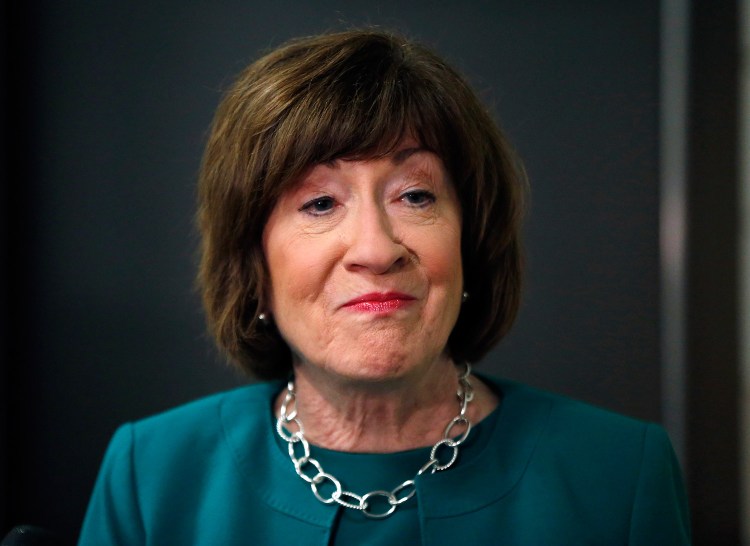BRUNSWICK — U.S. Sen. Susan Collins of Maine is backing legislation to limit President Trump’s ability to fire special counsel Robert Mueller.
The move by Collins comes in the wake of Jeff Sessions’ ouster as attorney general and Trump’s choice of Matthew Whitaker, a Mueller critic, as acting attorney general.
Though Collins said Deputy Attorney General Rod Rosenstein continues to oversee the special counsel’s investigation into Russia’s efforts to influence the 2016 election, Maine’s Republican senator is concerned by comments that Whitaker made about the special counsel and the scope of his investigation.
“For these reasons, I believe that we should bring to the Senate floor legislation that would put restrictions on the ability of President Donald Trump to fire the Special Counsel,” Collins said in a statement her office issued Friday afternoon. “This bill would codify the restriction that the Special Counsel can only be fired for good cause and in writing. The bill further specifies that only a Senate-confirmed Justice Department official could remove the Special Counsel. Acting Attorney General Whitaker is not a Senate-confirmed official.
“Senate debate and passage of this bill would send a powerful message that Mr. Mueller must be able to complete his work unimpeded.”
Collins praised Sessions, calling him a man of integrity and great strength.
“He was unwavering when it came to protecting the integrity of the special counsel’s investigation,” Collins said during a visit to a Bath Iron Works facility earlier Friday. “When I read some of the comments that Mr. Whitaker has made about some of the parameters of the special council’s investigation, it is a great cause for concern.”
Whitaker’s comments about Mueller’s investigation into Russian meddling in the 2016 presidential election – including a 2017 CNN op-ed implying the investigation was overstepping its bounds – has Collins worried that Whitaker might impede the investigation or the reporting of its conclusions.
Collins said Friday she would support The Special Counsel and Integrity Act, a bill that would prevent White House interference in the investigation.
“I talked with one of my colleagues last night who is a major co-sponsor of the bill to put some parameters around the president’s ability to fire the special counsel,” Collins said. “He is going to be pushing for that bill to be brought to the Senate floor. I, too, believe that the bill should be brought to the Senate floor, debated and voted on.”
Collins doesn’t expect the bill to be well received by the president, but believes a show of support for Mueller’s investigation is needed.
“I know the president is never going to sign that bill into law and there are some legitimate constitutional issues,” Collins said. “Debating it and passing it would send a strong message that the special counsel’s work must be allowed to continue unimpeded.”
Collins joins Maine’s other senator, independent Angus King, in raising a warning over Sessions’ departure.
“The fact that (Trump) passed over Rod Rosenstein to appoint someone else who’s been critical certainly raises concerns,” King told the Morning Sentinel on Thursday. “I’m hoping Congress can act.”
U.S. Rep. Rep. Chellie Pingree, D-1st District, tweeted on Wednesday that the timing of Sessions’ resignation “raises red flags,” and wrote that she and her colleagues would be watching for interference from Trump into the Mueller investigation.
Pingree is co-sponsoring a House version of the Senate bill designed to protect the Mueller investigation.
Collins said she hasn’t had much time to reflect on the outcome of this week’s midterm elections. In Maine, Democrat Janet Mills won the governor’s race, and Democrats claimed majorities in the state House and Senate. Nationally, Democrats took control of the House and Republicans increased their majority in the Senate. Democrats also took more governors’ seats.
Collins acknowledged some of the possible factors for a blue wave.
“I don’t know what the exit polls have shown,” said Collins. “I know that health care was an issue. I know that Justice (Brett) Kavanaugh was an issue. I’m just not sure how it all interacts.”
Collins received a mix of praise and condemnation for her decision to back Kavanaugh’s confirmation to the U.S. Supreme Court. Hers was a key vote in placing him on the court amid accusations of a decades-old attempted sexual assault.
“This is an opportunity for people like me who try to bring people together to find common ground,” Collins said. “It’s not going to be one-party rule; we’re going to have support from both parties to get things done. Anyone’s who’s been elected wants to have accomplishments. My hope is that this will actually result in more significant accomplishments sent to the president.”
Collins, who hasn’t committed to running for re-election in 2020, expressed displeasure with ranked-choice voting, used for the first time this year in a Maine election.
“The issue with ranked-choice voting is that it can result in the person who received the most votes not being selected to represent the people of Maine,” Collins said. “That is an odd outcome to me.”
A close race in Maine’s 2nd Congressional District between incumbent Republican Rep. Bruce Poliquin and Democrat Jared Golden is set to be the nation’s first congressional race decided by ranked-choice voting. Collins’ next campaign could be subject to ranked-choice voting.
“It is the current law in the state of Maine, and I respect that, but I do believe it could lead to strange outcomes,” she said.
Collins argued a runoff-style election would be a less complicated way to determine a winner. Collins didn’t say whether she thought Poliquin or the Republican Party should pursue a lawsuit if he wins on the first round of voting but loses after the ranked-choice process plays out.
“I think that’s a decision they have to make,” she said. “I would not presume to try to advise them on that.”
Collins added she is proud of the strong support she’s received from the people of Maine and said she believes she could win a majority of votes in a ranked-choice election.
Send questions/comments to the editors.




Success. Please wait for the page to reload. If the page does not reload within 5 seconds, please refresh the page.
Enter your email and password to access comments.
Hi, to comment on stories you must . This profile is in addition to your subscription and website login.
Already have a commenting profile? .
Invalid username/password.
Please check your email to confirm and complete your registration.
Only subscribers are eligible to post comments. Please subscribe or login first for digital access. Here’s why.
Use the form below to reset your password. When you've submitted your account email, we will send an email with a reset code.